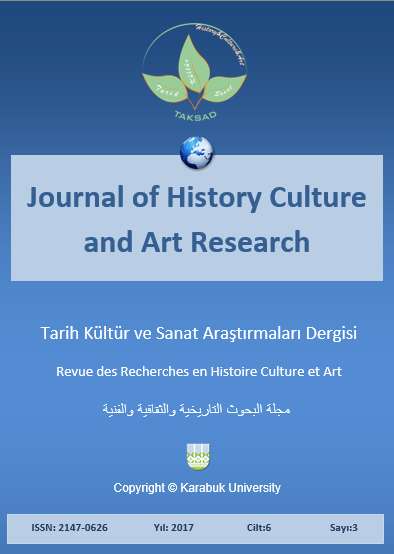The Effect of Tolerance on Balancing Social Relations in Terms of Molana’s Point of View in Masnawi
DOI:
https://doi.org/10.7596/taksad.v6i3.986Keywords:
Masnavi, Molana, Mawlana, Tolerance, Balancing human relations, Heavenly and secular wisdom, Human rights.Abstract
Fresh perceptions and variations in concepts introduced by Molana are among the beautiful effects of Masnavi. It is full of various ploys and mystical paraphrases which imply a new meaning in social issues. In this paper, after a short study of tolerance and its background in Islamic culture and western civilization, it has been discussed socially in Molana’s period. The researchers try to explain tolerance on the basis of two standpoints, by believing that it has a deep influence on balancing human relations. Firstly, we want to know if it is a heavenly or a secular issue since our mystical works talk about an inner source while modern thought is focused on the scientific and experiential roots of wisdom. But in the second step we investigate the relationship between the tolerance and its benefit for the human social rights. Although Molana’s attitude in most of Masnavi’s poems relies on the traditional points of view, this study has realized his mind clarity and vigilance and has come to valuable deductions. He has observed the deepest psychological events and has written them down.
References
Aristotle (1992). Metaphysics. Tehran: Hekmat Publications.
Avesta, Mehrdad (2011). Research methods in anthropology logic and beauty. Tehran: Sureh Mehr Publications.
Azad, Peyman (2002). Masnavi, language knowledge. Tehran: Alborz Publication.
Cranston, Maurice (1997). Tolerance. Translated by Mohammad Saeed Hanaei Kashani. Culture completed, 7.
Dehkhoda, Ali Akbar (1993). Dictionaries. Edited by Mohammad Moin and Jafar Shahidi. Tehran: Tehran University Press.
Ghannadan, Reza (2012). The Meaning of Meaning: look elsewhere. China first. Tehran: Mehr Vista Publications.
Jannesari, Nasser (1998). The Relationship between the development of ideas and the development of values. Cultural Universe. No. 148, the fifteenth year.
Ketabi, Ahmad (2010). What I have said all circumstances you (Introduction to the Study of psychological concepts in the works of Rumi). Tehran: Institute for Humanities and Cultural Studies.
Madani, Amir Hossein (2006). Molana and unpretentious irreconcilable. Development of Persian language and literature education, 20(1).
Mansouri Larijani, Esmaeil (1997). The place of pluralism in the field of religion and mysticism. Cultural Universe, 14, February.
Mashoor, Parvindokht (2006). Brothers (seventeen papers in literature and mysticism). China first. From Rudaki. Mashhad: Ahang Ghalam Publications.
Moin, Mohammad (1992). Persian Culture. Eighth China. Tehran: Amir Kabir Publications.
Pournamdarian, Taghi (2009). In the shadow of the sun, and deconstructs the poetry of Rumi's Persian poetry. Tehran: Sokhan Publications.
Rumi, Jalal al-Din (1992). Masnavi. With the correction of Reynold A. Nicholson. Third edition. Tehran: Behzad Publications.
Saada - Gendron, Julian (2003). Tolerance on West thought. Translated by Abbas Bagheri. Tehran: Ney Publications.
Sarrami, Ghadamali (1990). From Earth to Heaven. Tehran: Tabesh Publications.
Shafiee Kadkani, Mohammad Reza (2005). The mind and the language of poetry. Hafez Monthly Management, 14.
Shafiee Kadkani, Mohammad Reza (2012). Resurrection Words. China first. Tehran: Sokhan Publications.
Sheykholeslami, Ali (1991). Masnavi full human face. Cultural Universe, 80, February.
Shoja Keihani, Jafar (2006). Relaxation in Persian literature. Completed the Academy, 8(1).
Soroush, Abdulkarim (2009). Gambling Romance. Fourteenth edition. Tehran: Serat Publications.
Soroush, Abdulkarim (2010). God's Ethics. Eighth edition. Tehran: Tarhe No Publications.
Vazin Pour, Nader (1992). Spiritual Sun. Fourth Edition. Tehran: Amir Kabir Publications.
Zamani, Karim (2012). A Comprehensive Description of Masnavi. Twenty-ninth edition. Tehran: Information Publications.
Zarrinkoub, Abdulhossein (1991). The Convoy of Hilla. Sixth edition. Tehran: Scientific Publications.
Zarrinkoub, Abdulhossein (2002). Step to Meet God. Twentieth edition. Tehran: Scientific Publications.
Downloads
How to Cite
Issue
Section
License
All papers licensed under Creative Commons 4.0 CC-BY.- Share — copy and redistribute the material in any medium or format
- Adapt — remix, transform, and build upon the material for any purpose, even commercially.
Under the following terms:
Attribution — You must give appropriate credit, provide a link to the license, and indicate if changes were made. You may do so in any reasonable manner, but not in any way that suggests the licensor endorses you or your use.
- No additional restrictions — You may not apply legal terms or technological measures that legally restrict others from doing anything the license permits.







